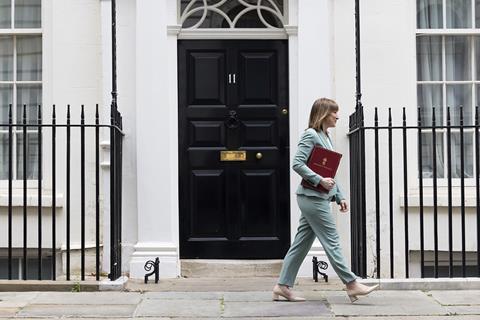But day-to-day cuts see housing ministry hatching plans to simplify grant funding and roll out AI
The chancellor has announced £10bn for “financial investments” in the spending review this afternoon, with some of the money to support delivery of new homes.
The new funding, which came alongside confirmation of the expected £39bn for the Affordable Homes Programme (AHP), will be delivered at least in part through Homes England and is intended to “crowd in” private investment through loans and equity investments.

It comes as the result of changes made by Rachel Reeves last autumn to enable the greater use of financial transactions by government bodies to support investments in public infrastructure.
Speaking in the House of Commons today, the chancellor said: “In line with that commitment, I am providing an additional £10bn for financial investments, including to be delivered through Homes England, to crowd in private investment and unlock hundreds of thousands more homes.”
Her speech confirmed plans announced yesterday to invest £39bn over 10 years in the AHP.
The chancellor said she was “proud to announce the biggest cash injection in new social and affordable homes in 50 years” and reported that “towns and cities, including Blackpool, Preston, Sheffield and Swindon, have already had plans to bring forward bids to build those homes in their communities”.
Documents released by the Treasury revealed that spending through the AHP would reach £4bn per year in 2029-30 and rise in line with inflation subsequently.
Reeves also confirmed a 10-year social housing rent settlement from 2026 at CPI+1%, with a consultation on implementing rent convergence set to follow.
New announcements on the day included £2.5bn over the spending review period for low-interest loans to social housing providers to boost development capacity, and equal access for social housing providers to the Building Safety Fund.
As a result, registered providers will have access to more than £1bn of investment for remediation between 2026/27 and 2029/30.
But, despite the Treasury agreeing to significant capital investment in new housing, the chancellor has demanded cuts to day-to-day spending for the housing ministry. The resource budget for day-to-day spending at the Ministry of Housing, Communities and Local Government (MHCLG) will fall 1.4% during phase two of the spending review, which runs between 2025/26 and 2028/29.
Department savings identified through the Treasury’s zero-based review include cutting communications and marketing spending by 70%, reducing external legal costs and abolishing the Office for Local Government.
The MHCLG has also worked with the Office of Value for Money to identify £50m of technical efficiencies by 2028-29, to be delivered through workforce and digital reform. This will include improving productivity using AI, insourcing services, and using “digitally enabled processes” to support cladding remediation delivery.
It also plans to simplify local government funding by reducing the number of “onerous” competitive bidding processes.
Further detail on how it will consolidate existing local government grant funding schemes will be published through the 2026-27 Local Government Finance Settlement (LGFS).
Spending review at a glance
- £39bn for a new 10-year Affordable Homes Programme
- An additional £10bn for financial investments, including to be delivered through Homes England “to crowd in private investment”
- £14.2bn for a new nuclear power station Sizewell C
- £2.5bn confirmed for Small Modular Reactors as part of its industrial strategy to be published this summer
- Providing £15.6 in total by 2031-32 for the elected mayors of some of England’s largest city regions to invest in local transport plus £2.3bn investment in local transport grant
- Multi-year settlement for Transport for London totalling £2.2bn
- £3.5bn for the Transpennine Route Upgrade between Manchester and Leeds
- £2.5bn to deliver East West Rail “unlocking the potential of the Oxford to Cambridge Growth Corridor”
- A 10-year rent settlement under which annual rents increase by CPI plus 1%
- £7bn of infrastructure funding for a “once-in-a-generation” renewal of military accommodation
- A consultation on re-introducing rent convergence
- £2.5bn in low interest loans for social housing providers to boost their development capacity
- £950m of investment for the fourth round of the Local Authority Housing Fund
- Protecting spending on tackling homelessness and rough sleeping, and providing £100m, including from the Transformation Fund, for early interventions to prevent homelessness
- Establishing a new local growth fund for specific mayoral city regions in the North and Midlands
- Investing in up to 350 deprived communities across the UK, to “fund interventions including community cohesion, regeneration and improving the public realm”
- Resource budget for MHCLG to fall 1.4% between 2025/26 and 2028/29
- Savings identified through the Treasury’s zero based review include cutting communications and marketing spending by 70%
- MHCLG has identified £50m of technical efficiencies by 2028-29, to be delivered through workforce and digital reform
















No comments yet